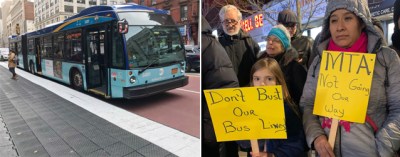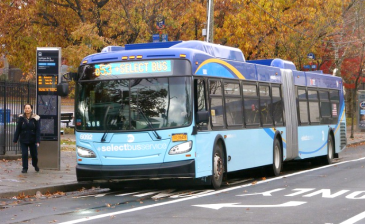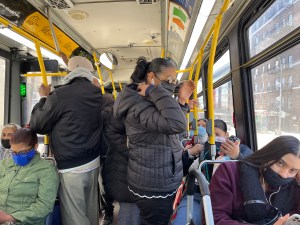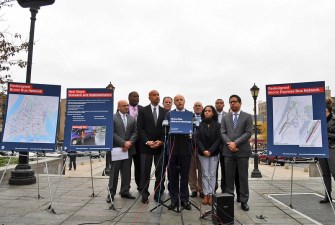Op-Ed: MTA’s Queens Bus Redesign is Not Good for Jackson Heights
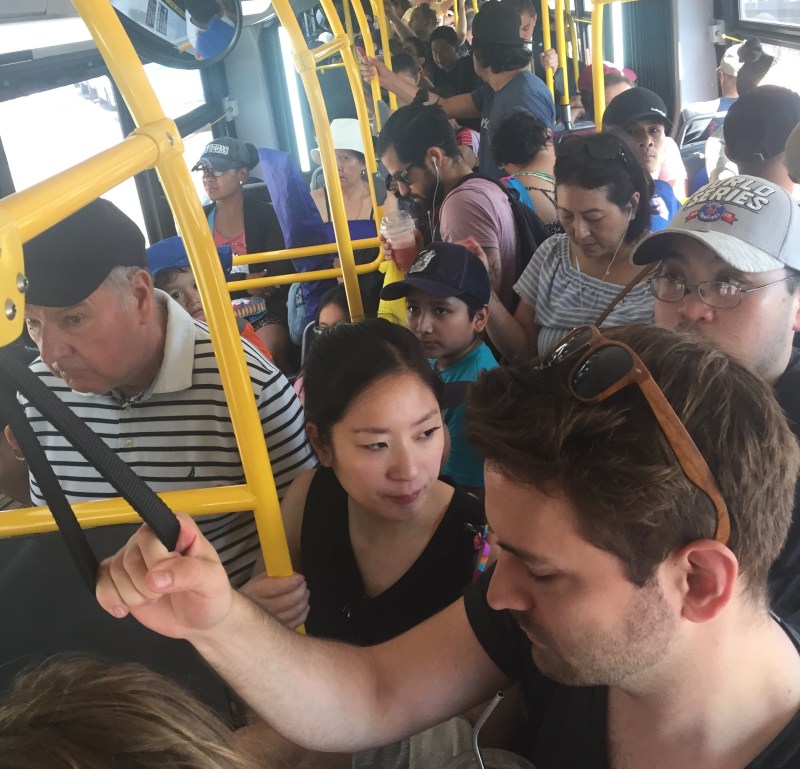
An initial analysis in Streetsblog suggested that the MTA’s overall redesign of the Queens bus network had many positives. But specific and glaring problems are starting to emerge. We invited Jim Burke, a Queens resident, transit user and safe streets activist, to share his thoughts.

I really had high hopes for the Queens bus redesign [draft plan here]. I imagined speedier buses, fewer stops, all door boarding, camera enforced priority bus lanes, new destinations and access to more of New York City from all areas of Queens.
I am intimately familiar with the buses in Queens in general but specifically those in Jackson Heights and the Rockaways, having used them for over 30 years. After studying the changes to the Jackson Heights and Rockaway bus redesign, I am quite disappointed. I will focus on Jackson Heights because it has one of the best bus networks in Queens and will suffer some of the greatest losses under the proposed redesign.
Currently Jackson Heights has an excellent bus network that enables residents in Jackson Heights to travel just about the whole borough and beyond — to Manhattan, Rockaway, Flushing, East Elmhurst, Elmhurst, Corona, Woodside, Woodhaven, Sunnyside, Astoria, Long Island City, Howard Beach, Broad Channel, Rego Park, and LaGuardia — frequently by using one bus.
I have four main objections and areas of concern regarding the proposed redesign:
- From the way the bus redesign has been done, it’s obviously planned to be revenue neutral so in order to beef up service in one neighborhood or go to new destinations it cuts service from elsewhere.
- Its main objective is to take you to closest subway without causing any inconvenience to private cars or making any hard choices that would impact parking or travel lanes.
- It assumes you want to or are physically able to or comfortable in taking the subway.
- The bus redesigns focuses on some large institutions, but really fails to take into account the intrinsic attractions of a neighborhood itself.
Let’s break that down:
Revenue Neutral
Of course, the network in Jackson Heights could use some tweaks to make it better, but instead of building on its strength, the MTA has completely re-imagined it. Now it would require multiple buses to get to the above destinations, if possible at all. In many cases, service is being cut on just about every line in this neighborhood to save money.
Main Objective
The main goal of the redesign, it seems, is to get riders to the closest subway (while making assumption you want the subway).
Subways are often not physically accessible or desirable to everyone. There are lots of elderly people who have aged in place and strictly take the buses and others who simply prefer buses. The subways are overcrowded, especially in Jackson Heights. They are also being worked on and re-routed most nights, weekdays during the day and weekends. They will have spotty service off hours and will not be reliable for a number of years.
However, under the new design, the guiding principle is to bring you to the closest subway. Most buses like the current Q49, Q32, Q33 and Q53 will no longer go to the Roosevelt Hub. Instead, the redesign will focus on getting you to the closest subway stop, which will often be a less-desirable location without accessibility or express service.
For example, the Q49 replacement will bring you to the 7 train at 90th Street or the R/M at the Elmhurst Avenue instead of to the 74th Street/Jackson Heights hub that has elevators and links to the E, F, R, M and 7 trains, and a number of buses.
It’s the neighborhood
The re-design doesn’t take into account that many people are going to or in the direction of the 74th and Roosevelt hub are going for the neighborhood itself. They are traveling within or to the neighborhood for the Indian restaurants, Colombian places, the many bakeries, dance places, straight bars, gay bars, for Mexican tacos, gift shops, clothing stores, to hang out in Diversity Plaza, to sit and have coffee at Lety’s or Espresso 77, to go the library, to the Jewish Center for all of the senior programs or a political club or other community-wide events held there. Or to grab a burger at Emoji burger, get Thai or Tibetan food. Shop at Patel Brothers or the mom and pop stores.
None of our longtime buses will stop there any longer. How will residents get to these areas? How will visitors?
Those who take the Q66 to shop in Corona or Flushing they will still be able to do so. However, if you work or go to the movies in Astoria or go for Greek or Arab food, or to go to the superior parks located in Astoria or Long Island City or to grab the closest Citi Bike in Queens, you will be out of luck.
The Q66 replacement will only travel between Flushing and Woodside, so Astoria and Long Island City will no longer be accessible from the Q66, which will now drop you off at a local subway stop or force you to take other buses to get to where one bus will take you now.
The buses to Manhattan will also be a thing of the past.
For those who use the Q72 to go to Rego Park or to LaGuardia or any of the shops and restaurants on Junction, you are in luck — sort of. The MTA is proposing no changes — so it will remain the same slow, infrequent, unreliable bus you have come to loathe.
If you currently take the Q53 in either direction, you will be out of luck. One bus stop to the Woodside neighborhood and the LIRR station will be a thing of the past. After decades of reliable, one-seat service to the beach, you will need three buses to get to Rockaway Park under the redesign. Again no residents requested these changes to the Q53 — this is a service cut pure and simple.
With the advent of congestion pricing and the ongoing much needed subway repairs we should be adding more service to more neighborhoods not cutting what we have and simply redistributing it.
We all hoped when this bus redesign plan was announced it would be a much more efficient way for our buses to navigate the city. We imagined the bus would no longer stop every two blocks, it would come much more often, be more reliable and go to new places. We imagined camera enforced bus lanes, all-door boarding and New York City Transit working with DOT to eliminate choke points.
The Bus Redesign team demonstrates an inferiority complex about buses. They think no one wants to take buses, and if they do only, they take them only as a last resort or the means to get to the subway. They can’t possibly have talked to current bus riders in Jackson Heights. I can’t imagine anyone demanding less service, fewer destinations and less access to one of the most vibrant areas of Jackson Heights for residents and visitors alike.
The new design favors fewer and shorter bus routes that bring you to the closest subway station and out of the neighborhood. On paper and in an office that might seem efficient, but it’s not how life is lived in Queens. We love our buses and we want them to work for us.
Jim Burke is a safe streets and better public transportation activist. Follow him on Twitter @jimrockaway. He urges readers to make their opinion known to the MTA via the redesign comment page here.
